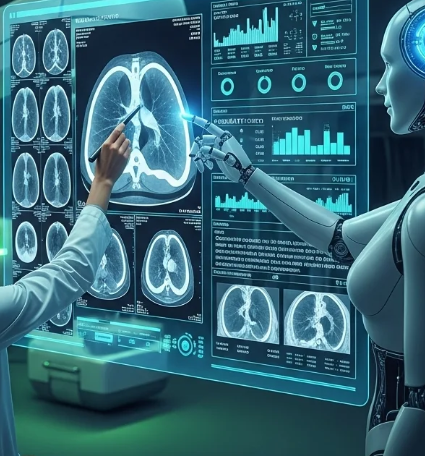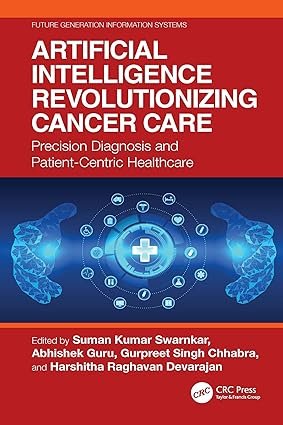Explore the latest AI tools for cancer, helping doctors detect, monitor, and fight the disease beyond human capabilities
Cancer occurs when certain cells in the body go “rogue” and multiply uncontrollably where they shouldn’t. It’s like unwanted plants spreading through a carefully tended garden, damaging everything around them. Fortunately, with AI, doctors can detect these cells earlier, analyze their behavior, and target treatments more precisely and effectively.
Prov-GigaPath – analyzes ultra-detailed pathology images.
LYNA (Google) – detects cancer in images.
Google AI tools for breast cancer screening – reduces false positives.
Galleri – AI-driven blood test detecting 50+ cancers.
Orion – focuses on lung cancer detection.
Watson for Oncology – recommends personalized treatments.
AlphaFold – predicts protein structures for drug design.
GENTRL – AI-designed drug discovery.
da Vinci surgical robots – enhanced by AI for precise surgery.
EvieAI – medical chatbot answering health questions.
MammaPrint – matches patients to clinical trials.
SHAP – interprets AI decisions for doctors.
C the Signs – AI helping primary care doctors in the UK detect cancer earlier.
Computers That See Better Than We Do
Robot Eyes to Detect the Invisible
Sometimes, cancer hides so well inside our bodies that even the smartest doctors can miss it early on. But now, doctors have special computers that can examine images from X-rays, CT scans, or MRIs and spot tiny details invisible to the naked eye. It’s like having magical, super-powered glasses!
For example, Prov-GigaPath analyzes ultra-detailed pathology images, millions of times richer than regular pictures. It can point out subtle abnormalities that require immediate attention.

Another system by Google called LYNA is a champion at detecting cancer in images. It recognizes diseased cells 99 times out of 100, just like a top student identifying patterns—but here, it’s spotting malignant cells instead of cats and dogs.
Google also developed AI tools to help doctors screen for breast cancer, reducing false positives and missed diagnoses. Thanks to these AI assistants, patients get more accurate results and less unnecessary anxiety.
A “Magic” Blood Test
Now, imagine detecting cancer with just a drop of blood, like a routine finger prick. When cancer starts, it leaves tiny clues in the blood—like breadcrumb trails—too small to see with standard microscopes. But intelligent computers can analyze these clues.
Galleri is one AI-driven test that can detect over 50 types of cancer from a single blood sample, acting like a super-sleuth solving multiple mysteries at once.
Another AI system, Orion, focuses on lung cancer, detecting it with 94% accuracy, even at very early stages. This makes diagnosis far less invasive than traditional surgeries.
AI Tools for Cancer : Treatments Designed Just for You
Every Patient Is Unique
Just like everyone has unique fingerprints and preferences, each cancer is unique. Doctors can no longer prescribe one-size-fits-all treatments.
AI platforms analyze patient data, genomic sequences, and cancer behavior to recommend the best treatment, dose, and schedule. For example, Watson for Oncology can process all a patient’s medical records in under a minute, suggesting the most effective therapy. It’s like having a super-intelligent assistant who knows every medical textbook by heart.
Accelerating Drug Discovery
Developing new drugs traditionally takes years, testing millions of possibilities. AI changes this by simulating millions of drug interactions on computers first.
AlphaFold predicts the exact structure of proteins from their genetic sequences, helping scientists design drugs that fit perfectly.
GENTRL even created a new drug in just 21 days—a task that normally takes years—demonstrating AI’s power to accelerate innovation.
Ultra-Precise Surgical Robots
Imagine a robot with hands that never tremble, capable of movements a thousand times more precise than humans, and eyes like X-rays. da Vinci surgical robots can perform operations with incredible accuracy, and now AI enhances them by providing real-time guidance during surgery.
In recent studies combining AI and augmented reality (AR) during lung surgeries, surgeons achieved:
- 30% more precision
- 25% faster operations
- 20% fewer post-operative complications
It’s like giving doctors superpowers!
Continuous Monitoring
Electronic Guardians
After cancer treatment, monitoring is critical. Now, wearable devices like smartwatches, rings, and sensors track heart rate, sleep, activity, and more. AI analyzes this data to alert doctors about subtle changes, acting like a 24/7 electronic guardian.
EvieAI, a chatbot trained on over 100,000 medical books, can answer health questions, providing guidance while advising when to consult a real doctor.
Matching Patients to Clinical Trials
Finding the right volunteers for new treatments is tricky. AI now reads thousands of records in minutes, identifying ideal candidates for clinical trials. For instance, MammaPrint uses AI to avoid unnecessary chemotherapy for nearly half of eligible patients, tailoring treatment precisely.
Challenges to Solve
AI Isn’t Perfect
AI must be trained on diverse datasets. If trained only on certain populations, it may underperform on patients from other backgrounds. Additionally, AI sometimes behaves like a “black box,” giving answers without clear explanations. Tools like SHAP help interpret AI decisions for doctors.
Privacy and Fair Access
AI handles sensitive health data, requiring robust digital security. Equal access is critical; if only wealthy hospitals have advanced AI, care disparities increase. Policymakers are working to ensure ethical and fair AI healthcare globally.
The Future: Superpowers for Doctors
More Powerful Computers
Quantum computers will allow AI to simulate the human body in incredible detail, creating digital twins to test treatments virtually before applying them to patients.
Federated learning will let AI systems at hospitals worldwide learn collectively without sharing private patient data, accelerating innovation while maintaining privacy.
Predictive Medicine
AI will help doctors predict illnesses before they occur, suggesting preventive measures. Scientists aim for zero deaths from detectable cancers, a goal increasingly within reach thanks to AI.
Patients as Active Participants
Patients can monitor their own health with apps and connected devices, sharing insights with doctors for personalized care. AI explains conditions in plain language, sends reminders, and helps patients make informed decisions.
How AI Learns to Detect Cancer
AI studies millions of images of healthy and diseased cells, learning to recognize patterns invisible to humans. With data from over 100,000 patients, systems like LYNA become expert “detectives,” spotting cancers early.
Real-World Examples
- C the Signs: AI helping primary care doctors in the UK detect cancer earlier, improving early detection rates by 12%.
- AI-designed drugs targeting CDK8, tested in labs with 2,500x higher effectiveness than expected.
- AI-assisted surgeries for esophageal cancer with real-time image analysis for precise treatment.
Why It Matters
- Saves Lives: Early detection dramatically improves outcomes.
- Reduces Costs: Early treatment and precision care lower overall healthcare expenses.
- Empowers Doctors: AI complements doctors’ expertise, reducing errors and workload.
Training Future Doctors
Medical students now learn to collaborate with AI, understanding when to trust algorithms, how to protect patient privacy, and how to use AI ethically.
Why Doctors + AI = Unbeatable
The future isn’t about replacing human physicians—it’s about creating an unstoppable alliance where human compassion meets artificial precision, forming medicine’s ultimate superteam.
- Humans bring empathy, judgment, and compassion.
- AI brings precision, memory, and pattern recognition.
- Surgical robots provide ultra-precise execution.
- Future quantum computers will calculate solutions at lightning speed.
Disclaimer: This educational content was developed with AI assistance by a physician. It is intended for informational purposes only and does not replace professional medical advice. Always consult a qualified healthcare professional for personalized guidance. The information provided is valid as of the date indicated at the end of the article.


Comments